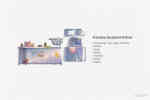Step 2 of 5•2 minutes read
PHYSICAL Contamination and Control
Remember physical contamination is not only very unpleasant but it can also cause harm through choking for example.
Sources of Physical Contamination

Physical contamination can happen during delivery from suppliers. The shipping company will only use reputable suppliers with excellent practices for preventing physical contamination during delivery.
It is the role of the teams that accept deliveries to check them to ensure they are safe from any contamination. They will follow and complete a delivery checklist.

Remove as much packaging as possible before bringing it on board. Always unpack away from food preparation areas and do not have a notice board with pins in the food preparation areas. Most ships have an unpacking area to avoid the risk of physical contamination.

Providing crew with training and cleaning instructions for effective equipment cleaning and ensuring it is put back together correctly with no loose parts. If they are not trained equipment may not go back together properly. Always check for equipment damages that may end up in the food.
A planned approach to pest control so droppings and gnawed packaging do not end up in the food is vital. Avoid waste accumulation to reduce the risk of attracting pests and store food waste in sealed containers or tied black bags. There is more about pests later in this training
Plan galley and pantry maintenance so that it does not happen when food is being prepared are essential. Ships are almost always well maintained, but pay special attention during shipyard, refit or when contractors are on board. Equipment, nuts, bolts, pieces of wiring etc. can easily contaminate food if areas are not thoroughly cleaned after works have been completed. Avoid machinery maintenance in galleys and pantries. Move to another area if possible.

Additional Controls for Physical Contamination
Crew should wear the correct uniform and head coverings with no jewellery in the galley and other food areas. Prohibiting unauthorised crew and visitors from entering the galley will reduce the risk of physical contamination.
Glass breakages need to be dealt with as part of standard operating procedures. It is very easy for broken glass to enter food if not handled correctly.
The crew will be trained to report defects on any equipment or parts of the ship to their supervisor or manager. Always prevent notice boards with drawing pins in food areas and paperwork with staples. Use high-quality equipment that is hard, non-permeable and in good condition especially avoiding equipment made of softwood.